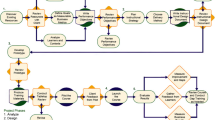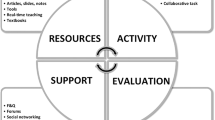ABSTRACT
This qualitative study explores the process of implementing effective online teaching practices through interviews with thirty exemplary instructors. Emergent themes include providing students with constructive feedback, fostering interaction and involvement, facilitating student learning, and maintaining instructor presence and organization. Analyses of the findings and implications for online instruction are presented.
Similar content being viewed by others
References
Bain, K. (2004). What the best college teachers do. Cambridge, MA: Harvard University Press.
Berge, Z. L. (2002). Active, interactive, and reflective e-learning. Quarterly Review of Distance Education, 3, 181–190.
Brown, R. E. (2001). The process of community-building in distance learning classes. Journal of Asynchronous Learning Networks, 5, 18–35. Retrieved January 7, 2004, from http://www.aln.org/publications/jaln/v5n2/pdf/v5n2_brown.pdf.
Chickering, A. W., & Ehrmann, S. C. (1996). Implementing the seven principles: Technology as lever. AAHE Bulletin, 49(2), 3–6.
Chickering, A. W., & Gamson, Z. F. (1987). Seven principles of good practice in undergraduate education. AAHE Bulletin, 39(7), 3–7.
Gunn, C. (2001). Effective online teaching: How far do the frameworks go? Meeting at the crossroads: Proceedings of the 2001 annual conference of the Australasian Society for Computers in Learning in Tertiary Education.
Hacker, D. J., & Niederhauser, D. S. (2000). Promoting deep and durable learning in the online classroom. In R. E. Weiss, D. S. Knowlton, & B. W. Speck (Eds.), Principles of effective teaching in the online classroom (pp. 53–64). San Francisco, CA: Jossey-Bass.
King, J., & Doerfert, D. (1996). Interaction in the distance education setting. Retrieved January 7, 2004, from University of Missouri-Columbia, Department of Agriculture, Food, and Natural Resources Web site: http://www.ssu.missouri.edu/ssu/Aged/NAERM/s-e-4.htm.
Knowlton, D. S. (2000). A theoretical framework for the online classroom: A defense and delineation of a student-centered pedagogy. In R. E. Weiss, D. S. Knowlton, & B. W. Speck (Eds.), Principles of effective teaching in the online classroom (pp. 5–14). San Francisco, CA: Jossey-Bass.
Lee, J., & Gibson, C. C. (2003). Self-direction in an online course through computer-mediated interaction. American Journal of Distance Education, 17, 173–187.
Mayadas, F., Bourne, J., & Moore, J. C. (2002). Introduction. In J. Bourne & J. C. Moore (Eds.), Elements of quality online education: Practice and direction (pp. 7–13). Needham, MA: Sloan Consortium.
Merriam, S. B. (1998). Qualitative research and case study application in education (2 nd ed.). San Francisco, CA: Jossey-Bass.
Moore, M. (1989). Editorial: Three types of interaction. American Journal of Distance Education, 3, 1–6.
Moore, M. (1993). Theory of transactional distance. In D. Keegan (Ed.), Theoretical Principles of Distance Education. (pp. 22–38). New York, NY: Routledge.
Patton, M. Q. (1990). Qualitative evaluation and research methods (2nd ed.). Newbury Park, CA: Sage.
Phipps, R., & Merisotis, J. (1999). What’s the difference? A review of contemporary research on the effectiveness of distance learning in higher education. Washington, DC: American Federation of Teachers and National Educational Association.
Shin, N. (2003). Transactional presence as a critical predictor of success in distance learning. Distance Education, 24, 69–86.
Strauss, A., & Corbin, J. (1990). Basics of qualitative research. Newbury Park, CA: Sage.
Wagner, E. D. (1997). Interactivity from agents to outcomes. In T. E. Cyrs (Ed.), Teaching and learning at a distance: What it takes to effectively design, deliver, and evaluate programs (pp. 19–26). San Francisco, CA: Jossey- Bass.
Wilson, B., & Ryder, M. (1996). Dynamic learning communities: An alternative to designed instructional systems. Proceedings of Selected Research and Development Presentations of the National Convention of the Association for Educational Communications and Technology. Indianapolis, IN. Retrieved January 7, 2004 from: http://carbon.cudenver.edu/∼mryder/dlc.html.
Acknowledgments
The authors thank the faculty participants of this study for their willingness to share their experiences and teaching strategies. Special thanks to Kerri-Lee Krause, Pam Dello-Russo, Cynthia Whitesel, and several anonymous reviewers for their helpful comments on earlier drafts of the paper.
Author information
Authors and Affiliations
Corresponding author
Additional information
An earlier version of this paper was presented at the 2004 Annual Meeting of the Association for the Study of Higher Education.
Cassandra C. Lewis is a research assistant at the University of Maryland University College. She is also a doctoral candidate in the department of Education Policy and Leadership at the University of Maryland, College Park. Husein Abdul-Hamid is Associate Provost and Executive Director of the Office of Evaluation, Research, and Grants at the University of Maryland University College. He holds a Ph.D. in Statistics from American University.
Rights and permissions
About this article
Cite this article
Lewis, C.C., Abdul-Hamid, H. Implementing Effective Online Teaching Practices: Voices of Exemplary Faculty. Innov High Educ 31, 83–98 (2006). https://doi.org/10.1007/s10755-006-9010-z
Published:
Issue Date:
DOI: https://doi.org/10.1007/s10755-006-9010-z




